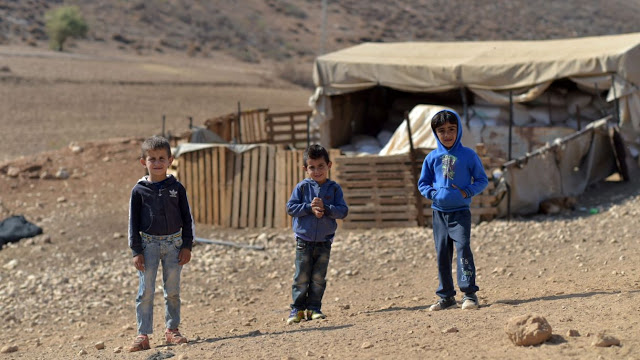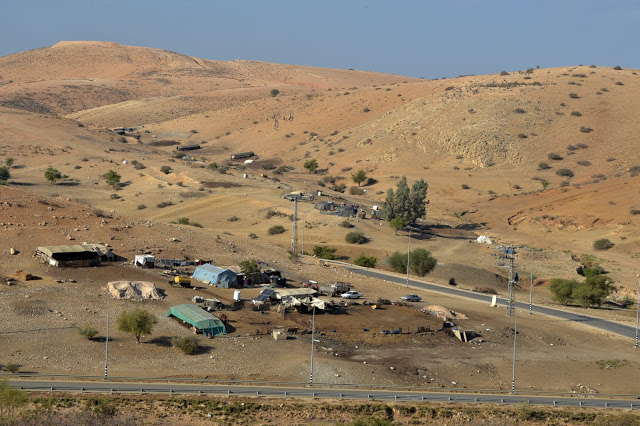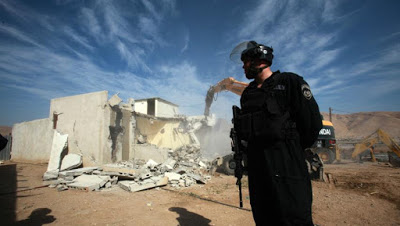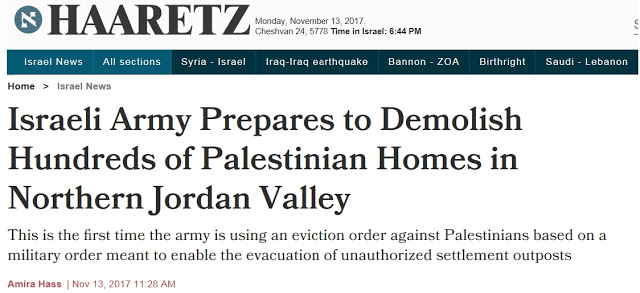 |
| Palestinian children in the northern Jordan Valley, November 10, 2017. Gil Eliahu |
This
is an urgent appeal for people to contact their MPs to ask them to contact the
Foreign Office to urge them to put pressure on their Israeli counterparts to
halt this illegal and inhumane action.
Below is an article
by Amira Hass in Ha’aretz on the situation.
The
demolition of homes and villages that Palestinians have been living in for
decades in order to make way for Jewish settlements is no
different to what happened in South Africa under Apartheid. In this case it is a ‘Jewish’ State that is
carrying out these war crimes, without any protest or opposition by our own government. When people then support BDS as a means of
punishing the aggressor then our political leaders throw up their hands in
horror at this ‘anti-Semitism’.
Tony
Greenstein
This
is the first time the army is using an eviction order against Palestinians
based on a military order meant to enable the evacuation of unauthorized
settlement outposts
demolition of homes and villages that Palestinians have been living in for
decades in order to make way for Jewish settlements is no
different to what happened in South Africa under Apartheid. In this case it is a ‘Jewish’ State that is
carrying out these war crimes, without any protest or opposition by our own government. When people then support BDS as a means of
punishing the aggressor then our political leaders throw up their hands in
horror at this ‘anti-Semitism’.
Greenstein
is the first time the army is using an eviction order against Palestinians
based on a military order meant to enable the evacuation of unauthorized
settlement outposts
Nov
13, 2017 11:28 AM
13, 2017 11:28 AM
The
army has ordered some 300 Palestinians who have lived
for decades in the northern Jordan Valley to remove all their property from the
area — which they’re interpreting as an evacuation and house-demolition order.
army has ordered some 300 Palestinians who have lived
for decades in the northern Jordan Valley to remove all their property from the
area — which they’re interpreting as an evacuation and house-demolition order.
But
judging from the army’s response to Haaretz, it has modified its position
following an objection filed by the residents’ lawyer.
judging from the army’s response to Haaretz, it has modified its position
following an objection filed by the residents’ lawyer.
This
is the first time the army is using an eviction order against Palestinians
based on a military order meant to enable the evacuation of unauthorized
settlement outposts. The order in question is known as the “order regarding
unauthorized buildings.”
is the first time the army is using an eviction order against Palestinians
based on a military order meant to enable the evacuation of unauthorized
settlement outposts. The order in question is known as the “order regarding
unauthorized buildings.”
The
order was not handed to any of the affected Palestinians. Instead, on Thursday
morning soldiers simply left it on the road near their houses, which are
located near the village of Al-Maleh.
order was not handed to any of the affected Palestinians. Instead, on Thursday
morning soldiers simply left it on the road near their houses, which are
located near the village of Al-Maleh.
The
notice, dated November 1, was signed by the commander of the Israel Defense
Forces in the West Bank, Maj. Gen. Roni Numa. Officially known as a “declaration of delimited land,” it bars
anyone from entering the specified area for purposes of construction and
mandates the removal of all property from that area within eight days of the
day the notice was posted.
notice, dated November 1, was signed by the commander of the Israel Defense
Forces in the West Bank, Maj. Gen. Roni Numa. Officially known as a “declaration of delimited land,” it bars
anyone from entering the specified area for purposes of construction and
mandates the removal of all property from that area within eight days of the
day the notice was posted.
 |
| Ein al-Hilweh, in the northern Jordan Valley, November 10, 2017. Gil Eliahu |
The
order does not specify how many people will be evicted or give their names. But
judging by the accompanying map, it applies to an area of about 550 dunams (136
acres) in which some 300 Palestinians live in two herding communities, Ein
al-Hilweh and Umm Jamal. Both villages are within the jurisdiction of the
Al-Maleh rural council.
order does not specify how many people will be evicted or give their names. But
judging by the accompanying map, it applies to an area of about 550 dunams (136
acres) in which some 300 Palestinians live in two herding communities, Ein
al-Hilweh and Umm Jamal. Both villages are within the jurisdiction of the
Al-Maleh rural council.
The
herders are raising some 4,000 sheep, 200 camels and 600 cows. All the land in
question is either privately owned by Palestinians or owned by the Catholic
Church.
herders are raising some 4,000 sheep, 200 camels and 600 cows. All the land in
question is either privately owned by Palestinians or owned by the Catholic
Church.
The
“order regarding unauthorized buildings,” on which the eviction notice is
based, states in paragraph 6(b) that it does not apply to “anyone registered in
the area’s population registry,” meaning Palestinian residents of the West
Bank.
“order regarding unauthorized buildings,” on which the eviction notice is
based, states in paragraph 6(b) that it does not apply to “anyone registered in
the area’s population registry,” meaning Palestinian residents of the West
Bank.
Therefore,
attorney Tawfique Jabareen of Umm al-Fahm, who is representing the residents,
argues that the eviction notice has no legal validity and is null and void. That
is the essence of the objection he submitted to the military commander via the
latter’s legal adviser Saturday morning.
attorney Tawfique Jabareen of Umm al-Fahm, who is representing the residents,
argues that the eviction notice has no legal validity and is null and void. That
is the essence of the objection he submitted to the military commander via the
latter’s legal adviser Saturday morning.
 |
| Demolition of a Palestinian house |
Jabareen
also said the order had not been delivered to the affected residents, but was
simply left in the area eight days after it was signed. “Prima facie, this was
an action in bad faith, behind which lies an intent to deny the Palestinian
residents their right to a hearing or to submit objections against either the
order or the declaration,” he wrote.
also said the order had not been delivered to the affected residents, but was
simply left in the area eight days after it was signed. “Prima facie, this was
an action in bad faith, behind which lies an intent to deny the Palestinian
residents their right to a hearing or to submit objections against either the
order or the declaration,” he wrote.
As
Jabareen put it, “This is a mass expulsion order against the Palestinian
population that violates international law.”
Jabareen put it, “This is a mass expulsion order against the Palestinian
population that violates international law.”
For
its part, Israel’s Coordinator of Government Activities in the Territories
said:
its part, Israel’s Coordinator of Government Activities in the Territories
said:
“On November 9, 2017, the orders were
sent as part of enforcement efforts against illegal construction at the site.
The orders were served according to protocol, including physically serving it
at the location the order pertains to. The new order addresses illegally built
structures, not a presence at the location.”
sent as part of enforcement efforts against illegal construction at the site.
The orders were served according to protocol, including physically serving it
at the location the order pertains to. The new order addresses illegally built
structures, not a presence at the location.”
COGAT,
however, did not state where the people who live at the site would go if the
structures were demolished. It also did not answer Haaretz’s question on how
many people the orders would affect.
however, did not state where the people who live at the site would go if the
structures were demolished. It also did not answer Haaretz’s question on how
many people the orders would affect.
Residents
of Ein al-Hilweh said Friday that about two weeks ago, soldiers came to their
huts and demanded to see their ID cards, without offering any explanation.
of Ein al-Hilweh said Friday that about two weeks ago, soldiers came to their
huts and demanded to see their ID cards, without offering any explanation.
The
soldiers also used a drone to take aerial photographs of their communities.
Making lists of ID cards and taking photographs are steps that often precede evictions and demolitions by the IDF and its Civil
Administration in the West Bank, though residents said they did not see any
Civil Administration staffers this time.
soldiers also used a drone to take aerial photographs of their communities.
Making lists of ID cards and taking photographs are steps that often precede evictions and demolitions by the IDF and its Civil
Administration in the West Bank, though residents said they did not see any
Civil Administration staffers this time.
Nabil
Daragmeh told Haaretz that last Thursday he saw soldiers putting something
under a rock on the road in front of the hill where he lives. He also saw them
photographing whatever it was they had left by the road. After they had gone,
he went to see what it was.
Daragmeh told Haaretz that last Thursday he saw soldiers putting something
under a rock on the road in front of the hill where he lives. He also saw them
photographing whatever it was they had left by the road. After they had gone,
he went to see what it was.
He
found one Hebrew-language order that was signed and dated, another
Hebrew-language order that was neither signed nor dated, and a third order in
Arabic that was also neither signed nor dated. He immediately told the other
residents, who were frightened and confused.
found one Hebrew-language order that was signed and dated, another
Hebrew-language order that was neither signed nor dated, and a third order in
Arabic that was also neither signed nor dated. He immediately told the other
residents, who were frightened and confused.
These
herding communities have been in the area for decades, but Israel does not
allow them to connect to infrastructure or add new homes and public buildings
to keep up with their growing population and changing needs.
herding communities have been in the area for decades, but Israel does not
allow them to connect to infrastructure or add new homes and public buildings
to keep up with their growing population and changing needs.
Israel
has also used its control over the Palestinian population registry to prevent
the Palestinian Authority from listing the herders’ villages in the residence
line of their IDF cards. Instead, it insists that their hometown be listed as
Bardala, Ein al-Beida or some other village.
has also used its control over the Palestinian population registry to prevent
the Palestinian Authority from listing the herders’ villages in the residence
line of their IDF cards. Instead, it insists that their hometown be listed as
Bardala, Ein al-Beida or some other village.
Eviction,
demolition and property-seizure orders have been issued against the residents
for years, but never against all of them at once, and never based on the “order regarding unauthorized buildings.”
demolition and property-seizure orders have been issued against the residents
for years, but never against all of them at once, and never based on the “order regarding unauthorized buildings.”
In
2008, in an effort to alleviate the residents’ housing shortage, the UN Food
and Agriculture Organization built metal shelters for them, paid for by Japan.
In his letter to the military commander, Jabareen wrote that Japan and the
United Nations would not have built those shelters without the Civil
Administration’s permission, and such permission was indeed granted. But later
he said the administration retracted its consent.
2008, in an effort to alleviate the residents’ housing shortage, the UN Food
and Agriculture Organization built metal shelters for them, paid for by Japan.
In his letter to the military commander, Jabareen wrote that Japan and the
United Nations would not have built those shelters without the Civil
Administration’s permission, and such permission was indeed granted. But later
he said the administration retracted its consent.
“In recent years, a number of families
have repeatedly built illegally in the area. Any person who feels he is a
victim of the order can turn to the authorities within an eight-day time
frame,”
COGAT added.
have repeatedly built illegally in the area. Any person who feels he is a
victim of the order can turn to the authorities within an eight-day time
frame,”
COGAT added.
“Regarding some of the structures, the
authorities are examining claims by [the owners]. Regarding these structures,
no enforcement will be implemented until these examinations are complete.”
authorities are examining claims by [the owners]. Regarding these structures,
no enforcement will be implemented until these examinations are complete.”
On
a hill to the east of the area slated for eviction sits the settlement of
Maskiot. In 2005, it received an influx of settlers who had been evicted from
the Gaza Strip.
a hill to the east of the area slated for eviction sits the settlement of
Maskiot. In 2005, it received an influx of settlers who had been evicted from
the Gaza Strip.
Over
the last two years, two settlement outposts have also sprung up, one north and
the other south of Ein al-Hilweh. The Civil Administration has issued stop-work
orders against the outposts, but they still continue to expand. One of the
outposts is an offshoot of another illegal outpost in the process of being
legalized – Givat Salit. The second is located in the Umm Zuka nature reserve.
the last two years, two settlement outposts have also sprung up, one north and
the other south of Ein al-Hilweh. The Civil Administration has issued stop-work
orders against the outposts, but they still continue to expand. One of the
outposts is an offshoot of another illegal outpost in the process of being
legalized – Givat Salit. The second is located in the Umm Zuka nature reserve.
Both
outposts raise sheep and cows, and according to local Palestinians and
activists from the Ta’ayush and MachsomWatch organizations, herders from the
outposts often prevent the Palestinians from grazing their flocks. In 2011, one
resident of Ein al-Hilweh was forced to move his tent because of repeated
harassment by the settlers.
outposts raise sheep and cows, and according to local Palestinians and
activists from the Ta’ayush and MachsomWatch organizations, herders from the
outposts often prevent the Palestinians from grazing their flocks. In 2011, one
resident of Ein al-Hilweh was forced to move his tent because of repeated
harassment by the settlers.
Ein
al-Hilweh and Umm Jamal aren’t unique. Over the past few months, the IDF and
the Civil Administration have also taken steps toward evicting three other
Palestinian communities in the northern Jordan Valley – Khalat Makhoul,
Al-Farisiya (which is home to about 150 people) and Khumsa.
al-Hilweh and Umm Jamal aren’t unique. Over the past few months, the IDF and
the Civil Administration have also taken steps toward evicting three other
Palestinian communities in the northern Jordan Valley – Khalat Makhoul,
Al-Farisiya (which is home to about 150 people) and Khumsa.
Posted in Blog

